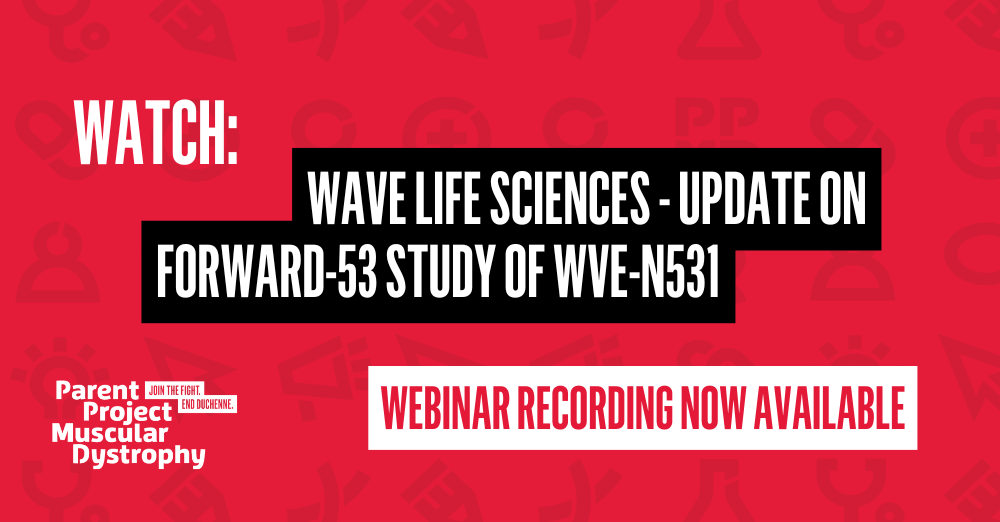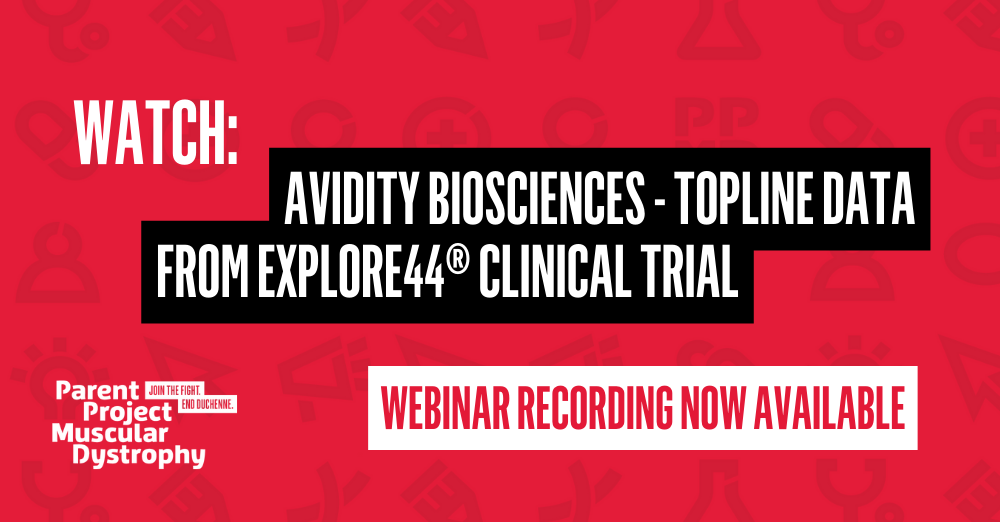
PPMD’s Biomarkers Initiative
The PPMD Biomarkers Initiative was developed to support the discovery and validation of biomarkers that can be used to:
- Enhance care of individuals with Duchenne and Becker by uncovering biomarkers that can be used to monitor disease progression or predict disease trajectory and early warning signs of complications.
- Improve drug development by increasing the number of safety markers used to monitor response to investigational products and accelerate time to approval by creating surrogate markers for measuring stabilization or improvement related to investigational products.
PPMD Funding
Over the years PPMD has supported numerous projects that have been working towards developing various biomarkers. Below you will find information on some of those efforts which have benefited from PPMD’s support and continue to drive forward the discovery and validation of biomarkers to help improve care and accelerate therapies.
 PPMD, along with Duchenne UK and MDA, Awards $686,500 to Development of Non-invasive Biomarker for Assessing Lean Muscle Mass
PPMD, along with Duchenne UK and MDA, Awards $686,500 to Development of Non-invasive Biomarker for Assessing Lean Muscle Mass
In collaboration with Duchenne UK and MDA, PPMD awarded The University of California Berkeley a $686,500 grant to continue development of a non-invasive biomarker for assessing lean muscle mass. This project is led by Dr. William Evans and will include multiple sites for assessing the new biomarker.
This project is building on a pilot study originally funded by DUK to investigate the use of a labelled creatine solution that can be used to measure the amount of lean muscle mass an individual has from a simple urine sample. This method of assessing muscle mass is significantly cheaper and could be made more readily available than current methodologies, allowing for easy deployment to both clinics and use in clinical trials. This 150 patient study will help to validate the ability of the biomarker to measure lean muscle mass and correlate it to functional outcome data, which will be important for its context of use.
Learn more >C-Path: Duchenne Regulatory Science Consortia – $1,200,000
PPMD was an original funder and continued supporter of the Duchenne Regulatory Science Consortia (DRSC) at the Critical Path Institute. DRSC has partnered with another group at C-Path, the Predictive Safety Testing Consortium (PSTC), in order to develop safety biomarkers for use in clinical trials in Duchenne.
DRSC has launched two separate safety biomarker projects which have both received positive support from regulators at FDA and EMA. The FDA has requested the Full Qualification Package for a liver damage biomarker and the Qualification Plan for a skeletal muscle damage biomarker.
Project 1 – Drug-Induced Liver Damage biomarker
The first project is the development of the safety biomarker glutamate dehydrogenase (GLDH) for detection of drug-induced liver damage. In clinical trials the current biomarker used for detecting damage to the liver from an investigational product is alanine aminotransferase (ALT). The challenge with ALT is that it is not expressed solely in the liver, but in multiple tissues of the body. This means that clinicians and researchers could falsely conclude an investigational product is damaging the liver, when it is really being released from other tissues. Increasing the specificity of the biomarker for liver damage by utilizing GLDH will allow for more sensitive and accurate information to drug developers.
Learn more >Project 2 – Drug-Induced Skeletal Muscle biomarker panel
The second project is developing a panel of biomarkers to detect drug-induced muscle damage. Current clinical trials utilize creatine kinase (CK) and aspartate aminotransferase (AST), however like the liver markers, these two biomarkers lack sensitivity and tissue specificity. To address this issue DRS-C and PSTC have developed a biomarker panel consisting of 4 proteins (TNNI2, MYL3, FABP3, and CKM) to be evaluated to detect potential muscle damage from investigational products.
Learn more >ImagingDMD – Awarded $301,648
PPMD was an initial funder of the ImagingDMD natural history study led by Dr. Krista Vandenborne. ImagingDMD is the most comprehensive Duchenne natural history study, running for over a decade, utilizing magnetic resonance imaging along with more traditional functional outcome measures to assess individuals with Duchenne.
ImagingDMD is working to develop imaging biomarkers to accelerate drug development and provide unbiased readouts of drug efficacy. They are working towards validation of Fat Fraction in the lower extremities as a biomarker for disease progression and predicting loss of ambulation. ImagingDMD is also working towards developing biomarkers for assessing non-ambulatory patients, which are an underserved population in the Duchenne clinical trial landscape.
Learn more >Wellstone Center of Excellence – Supplement Awards $1,598,891
PPMD provided additional funding support to the Wellstone grant at the Institute of Myology, with grants awarded to Drs. Lee Sweeney (University of Florida), Elizabeth McNally (Northwestern University), and Stan Nelson (University of California Los Angeles).
The Institute of Myology Wellstone supported multiple projects helping to improve Duchenne, some of work involved better understanding of genetic modifiers of Duchenne and their roles in disease progression. Essentially, understanding if there are other non-DMD gene variations individuals have that led to more or less severe disease. Research involved an exploration of the role of annexin A6 and A1 in fibrosis and their response to steroids and mineralocorticoids. Understanding how variants in the LTBP4 gene impacted cardiac and pulmonary function were also evaluated, while additional research was focused on uncovering how variations in LTPB4 and SPP1 impacted disease progression on lower extremity muscles.
The Future of PPMD’s Biomarkers Initiative
PPMD aims to fund researchers leveraging years of clinical and natural history data to work towards identifying protein biomarkers that can help us better understand Duchenne disease progression. Through deep characterization of patients with a wealth of clinical data we can begin to link together proteins that may identify the expected progression of a particular patient. This type of data has the potential to improve patient care, aid in trial design, and accelerate drug development to ensure we see more approvals of therapies that can be delivered to all patients.
 Duchenne Protein Mapping Project
Duchenne Protein Mapping Project
The next step of this Initiative is to define a Duchenne Protein Map in order to find patterns that can identify change. We will bring together years of clinical data, along with blood and urine collected during these studies to identify and map circulating proteins. This is a novel partnership that brings together SomaLogic’s technology, Imaging DMD, and Leiden University along with every family who has contributed to these studies. With this multi-pronged approach, we will further define how Duchenne progresses, and why.
Learn more >






